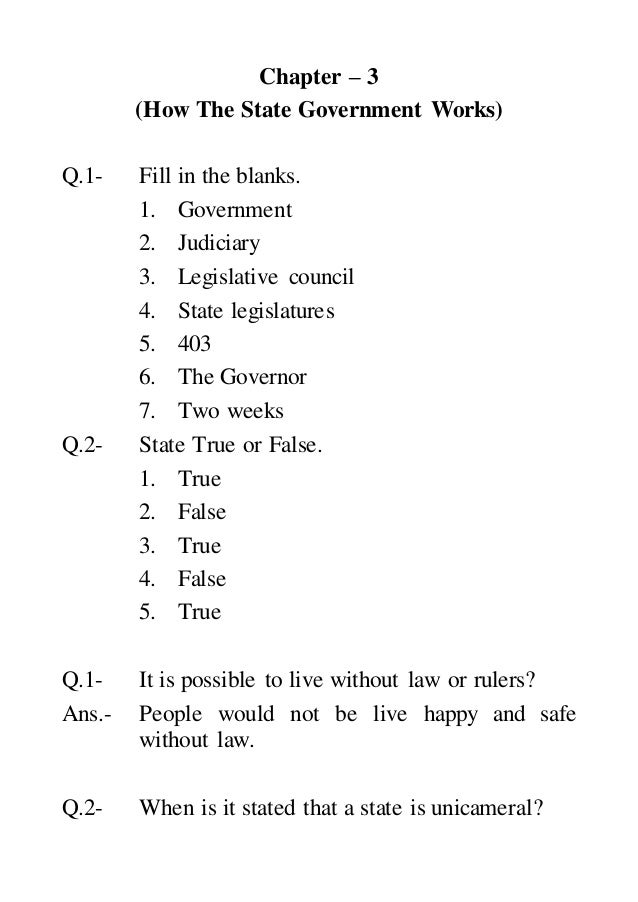Civics State Government Study Guide

Some state constitutions provide for the processes called Initiative, Referendum, and Recall. These procedures fall under the heading of Direct Democracy or allowing the average citizen to reclaim some of the power otherwise held by politicians and increasing citizen participation in the political process. Supporters of Direct Democracy suggest that these processes do not take away basic decision-making power from legislators and other elected officials, but simply allow for another form of checks and balances consistent with the Constitutional principle that the people retain the supreme political power in our democracy. Initiative - The Initiative process can best be described as a process that enables citizens to bypass their state legislature and place proposed statutes on an election ballot. Direct - allows citizens to place measures directly on the election ballot.
State Government Study Guide
Indirect - The legislature retains some control and they are given a chance to act on the proposed measures prior to them going on the ballot. Referendum The referendum also refers to a measure that appears on an election ballot. Legislative, whereby the Legislature refers a measure to the voters for approval, such as changes to the state constitution or bond issues or tax changes. Popular, which allows citizen voters to approve or repeal an act of the Legislature. This type of referendum is similar to the initiative in that both are triggered by petitions, and voters have to gather sufficient signatures to demand a popular vote for the law to be enacted by the Legislature. Advisory, which is rarely used. The governor or the Legislature, depending on the particular state, may place a question on the ballot to gauge public opinion, and the results of the voting are not binding.

Powers not granted to the federal government are reserved for states and the people, which are divided between state and local governments. Most Americans have more daily contact with their state and local governments than with the federal government.
Police departments, libraries, and schools — not to mention driver's licenses and parking tickets — usually fall under the oversight of state and local governments. Each state has its own written constitution, and these documents are often far more elaborate than their federal counterpart. Whereas the federal government and state governments share power in countless ways, a local government must be granted power by the state. In general, mayors, city councils, and other governing bodies are directly elected by the people. Federalism is a system of government in which power is divided between a national (federal) government and various state governments.
State And Local Government Civics Study Guide
In the United States, the U.S. Constitution gives certain powers to the federal government, other powers to the state governments, and yet other powers to both. States have their own legislative branch, the executive branch, and the judicial branch.

The states are empowered to pass, enforce, and interpret laws, as long as they do not violate the Constitution. The federal government determines foreign policy, with exclusive power to make treaties, declare war, and control imports and exports.
The federal government has the sole authority to print money. Most governmental responsibilities, however, are shared by state and federal governments and these include taxation, business regulation, environmental protection, and civil rights.
Fundamental Government & Civics Concepts - Chapter Summary To get reacquainted with fundamental government and civics concepts, open up the lessons in this chapter. Explore information about the responsibilities and rights of U.S. Citizenship, the steps in the naturalization process, and treaties about human rights. Read along with this chapter study guide to review the following:. Government at the local, state, and federal levels. The powers of the judicial, legislative, and executive branches.
U.S. Elections locally, statewide, and nationally. The process of the Electoral College. Humanitarian efforts and intervention. Political rights and justice. Groups that make laws in the American legal system. The process of how a bill transforms into a law Studying at home is not always possible, which is why we made our study materials completely mobile.
It doesn't matter if you have a phone, a tablet, a laptop, or some other device. Anything that can get you online will take you to our site. Everything we offer can be looked at day or night, because we want you to study at a time and place that works for your schedule. Are you worried that you don't have enough time to study? Believe it or not, if you have around 10 minutes, you can get through a lesson. We know you don't have large blocks of free time on a regular basis, but if you study during some of your daily breaks, not only can you get through this chapter, you can probably make your way through related chapters that you also need to review.